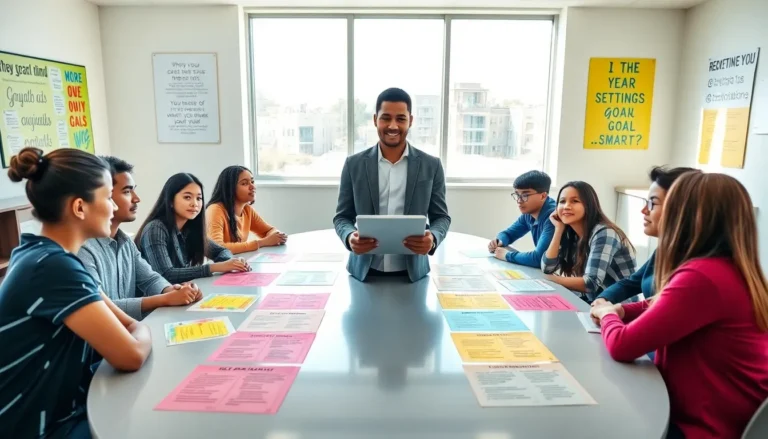Table of Contents
ToggleIn a world buzzing with distractions and endless to-do lists, self-mastery might sound like a mythical creature—like a unicorn that can juggle flaming swords. But fear not! Mastering oneself is not reserved for monks on mountaintops or superheroes in capes. It’s about harnessing that inner chaos and turning it into a well-oiled machine that even your coffee maker would envy.
Understanding Self-Mastery
Self-mastery involves recognizing and controlling one’s thoughts, emotions, and behaviors. It encompasses discipline, focus, and resilience. Individuals achieve self-mastery through consistent practice and self-reflection.
Achieving self-mastery often leads to enhanced productivity and improved decision-making. Knowing personal limits plays a crucial role in this journey. Recognizing triggers that disrupt focus can foster better emotional regulation.
Developing self-discipline requires setting clear, attainable goals. Creating daily habits that align with these goals is essential. Focusing on small, incremental changes enables individuals to experience success, building confidence over time.
Self-mastery also extends to the ability to adapt to challenges. It promotes a mindset of growth rather than frustration. Viewing failures as opportunities to learn fosters resilience. Consistent effort leads to personal growth, making success feel attainable.
Many resources are available to guide this journey. Books, workshops, and mentorship programs provide valuable strategies. Learning from others who have mastered themselves can inspire and motivate individuals.
Self-mastery is an achievable objective. Through mindfulness, discipline, and continuous learning, anyone can transform their inner chaos into a productive state. By prioritizing personal goals and maintaining focus, it becomes possible to navigate life’s distractions effectively.
The Importance of Self-Mastery

Gaining self-mastery enriches personal growth and emotional intelligence. Individuals often find that mastering oneself leads to a profound transformation in their lives.
Personal Growth
Self-mastery fosters personal growth by encouraging individuals to set clear goals. Achieving these goals leads to increased self-awareness and confidence. People often gain clarity about their strengths and weaknesses, which helps in making informed decisions. Incremental changes from consistent habits create a foundation for lasting success. This journey emphasizes resilience, enabling individuals to bounce back from setbacks and view them as opportunities for further growth. Personal growth not only impacts one’s career but also enhances relationships, making individuals more empathetic and effective communicators.
Emotional Intelligence
Emotional intelligence plays a significant role in self-mastery. Recognizing one’s emotions allows for better regulation of feelings and reactions. People who practice self-mastery develop strong empathy, enhancing their ability to connect with others. Understanding emotional triggers helps in managing responses during challenging situations. This awareness facilitates healthier relationships and improves decision-making skills. Individuals with high emotional intelligence exhibit greater resilience in the face of adversity. Their ability to navigate stress and maintain clarity leads to improved overall well-being.
Techniques for Achieving Self-Mastery
Achieving self-mastery involves practical techniques that foster growth and personal development. Two key areas focus on mindfulness practices and goal-setting strategies.
Mindfulness Practices
Mindfulness practices enhance self-awareness and emotional regulation. Meditation serves as a foundational tool, promoting present-moment awareness and reducing stress. Daily breathing exercises help individuals cultivate calm in chaotic environments. Engaging in mindful walks encourages connection with surroundings, boosting clarity in thought processes. Journaling encourages self-reflection, allowing exploration of thoughts and emotions, which leads to deeper insights. Incorporating these practices consistently creates a strong foundation for self-mastery, supporting emotional intelligence and resilience.
Goal Setting Strategies
Goal-setting strategies define the path toward self-mastery with clear objectives. Setting smart goals—specific, measurable, achievable, relevant, time-bound—ensures clarity and focus. Breaking large tasks into smaller, manageable steps helps track progress and maintain motivation. Regularly reviewing goals allows for adjustments based on evolving needs or circumstances. Celebrating small victories reinforces the habit of achieving objectives, building confidence over time. Engaging in accountability partnerships fosters support, encouraging commitment to personal growth. These techniques establish a structured approach to achieving self-mastery effectively.
Challenges in Self-Mastery
Self-mastery faces various challenges that require understanding and proactive strategies for effective navigation.
Overcoming Procrastination
Procrastination hinders personal progress and disrupts productivity. Recognizing its triggers helps individuals address underlying issues. Setting specific deadlines encourages accountability, while breaking tasks into smaller steps makes them less daunting. Employing techniques like the Pomodoro Technique, which involves working in focused bursts, increases momentum. Developing a routine reinforces commitment, creating a structured approach that minimizes distractions. Celebrating small achievements fosters motivation, making it easier to tackle larger goals.
Managing Stress
Stress management is essential for self-mastery as high stress levels impede focus and decision-making. Identifying stressors allows individuals to address them appropriately. Incorporating stress-relief techniques such as deep breathing exercises, regular physical activity, and mindfulness practices enhances emotional regulation. Establishing a balanced lifestyle, with adequate sleep and nutrition, supports overall well-being. Practicing gratitude and maintaining social connections contribute positively to managing stress. Building resilience through these strategies enables individuals to approach challenges with clarity and confidence.
Self-mastery is a transformative journey that empowers individuals to take control of their lives. By cultivating discipline and emotional intelligence, one can navigate challenges with resilience and clarity. The practical techniques highlighted in the article serve as valuable tools for anyone seeking personal growth. Embracing mindfulness and setting achievable goals lays the groundwork for lasting change.
As individuals commit to this journey, they not only enhance their productivity but also foster deeper connections with themselves and others. Ultimately, self-mastery is about unlocking potential and achieving a fulfilling life amidst distractions. With dedication and the right strategies, anyone can embark on this rewarding path toward self-discovery and improvement.




